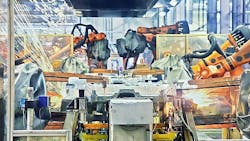The past year has seen a flourishing of interest in the Internet of Things (IoT) as the latest opportunity for growth in the technology sector. There remains plenty of reason for skepticism about IoT hype in the consumer space — not about whether it will happen but about whether the value it will bring will justify its costs in cybersecurity and the erosion of privacy — but the picture is very different on the factory floor. Industrial software combining the use of sensor data and network clouds to support advanced analytics and forecasting promises fantastic advances in productivity, resource allocation and deeper understanding of the dynamics of production.
Manufacturers in the industrial automation space have grasped the potential of building a robust industrial data platform and this year actively positioned themselves through acquisitions and internal structural changes to pursue the industrial IoT (IIoT) as a primary emphasis for future growth.
We’re now seeing a high-stakes race among large industrially oriented electrical manufacturers to realize the IIoT’s potential, each seeking to establish a standard software platform for gathering and interpreting data in the manufacturing, process, infrastructure, utility and related industries.
General Electric (GE), Boston, has perhaps been the most visible crusader for the potential of advanced industrial software this year, but it’s hardly alone. GE’s Predix industrial software platform is the centerpiece of its new GE Digital organization. In the past month the company announced acquisitions of Bit Stew Systems and Wise.io, which follow a long list of acquisitions to build out the capabilities of Predix.
GE has invested $1 billion in building its Predix platform and now has some years of experience using it in its production facilities. GE Digital CEO Bill Ruh says that GE is on target to bring in $6 billion in digital revenues this year and that the number could grow to $15 billion by 2020. But he stressed that this is just the beginning, adding that by 2020 the total market for industrial software and applications will be larger than the consumer internet, reaching $225 billion.
Schneider Electric, Paris, has likewise been building out its suite of industrial software built around its Wonderware tools for visualization and production management, Avantis for asset management and SimSci for process design. Its agreement to acquire UK-based Aveva Systems last year fell apart, but showed Schneider’s interest in further building out its software offerings.
ABB, Zurich, Switzerland, launched its own digital-first effort under the brand ABB Ability, bringing together software operations from its various business segments into a suite of offerings for the industrial IoT.
Siemens AG, Munich, Germany, announced a huge software deal last month with the $4.5 billion acquisition of Mentor Graphics as part of its own bid to digitize heavy industry. Wilsonville, Ore.-based Mentor sells software and hardware design-automation tools for the development and testing of advanced electronic systems. Mentor will become part of Siemens’s digital factory unit, which contributed €10.2 billion to Siemens’ €79.6 billion of revenue in the financial year through September, according to data compiled by Bloomberg.
Regardless of who ultimately “wins” the race to establish a cohesive and integrated platform for handling the profusion of plant-floor and process-line operational data, all this movement really does look like a sea change, and promises to keep the electrical industry in the vanguard of defining how work is done.
About the Author
Doug Chandler
Senior Staff Writer
Doug has been reporting and writing on the electrical industry for Electrical Wholesaling and Electrical Marketing since 1992 and still finds the industry’s evolution and the characters who inhabit its companies endlessly fascinating. That was true even before e-commerce, LED lighting and distributed generation began to disrupt so many of the electrical industry’s traditional practices.
Doug earned a BA in English Literature from the University of Kansas after spending a few years in KU’s William Allen White School of Journalism, then deciding he absolutely did not want to be a journalist. In the company of his wife, two kids, two dogs and two cats, he spends a lot of time in the garden and the kitchen – growing food, cooking, brewing beer – and helping to run the family coffee shop.
